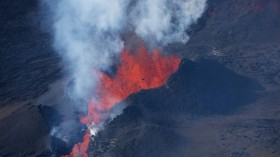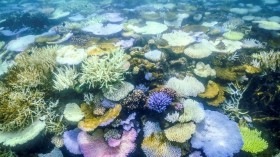High levels of carbon dioxide could impair the brain chemistry of fish, scientists found.
Researchers from the University of Miami Rosenstiel School of Marine and Atmospheric Science and the ARC Center of Excellence for Coral Reef Studies at James Cook University found that increased concentrations of carbon dioxide in the ocean alters the brain chemistry of fish that may lead to neurological impairment.
"Coral reef fish, which play a vital role in coral reef ecosystem, are already under threat from multiple human and natural stressors," Rachael Heuer, lead author of the study, said in a news release.
"By specifically understanding how brain and blood chemistry are linked to behavioral disruptions during CO2 exposure, we can better understand not only 'what' may happen during future ocean acidification scenarios, but 'why' it happens."
In the published in the journal Scientific Reports, researchers collected spiny damselfish from the reefs off Lizard Island in Australia's Great Barrier Reef. The fish were separated into two groups: one is exposed to ordinary CO2 "control conditions and the other exposed to elevated CO2 levels expected to occur by the year 2300. After the exposure, the two fish groups were subjected to a behavioral test, and brain and blood chemistry were measured.
In the behavioral test, the fish were given the choice between regular seawater and water containing danger cues such as the smell of an injured fish, which triggered alarm among fish exposed to normal levels of CO2 and was avoided by the fish as expected.
However, the group of damselfish exposed to high levels of CO2 spent more time in the water containing the danger cues and did not seem deterred. The researchers found that this group of fish had altered blood and brain chemistry, as their bodies were trying to adapt to the surge in carbon dioxide.
"Our findings support the idea that fish effectively prevent acidification of internal body fluids and tissues, but that these adjustments lead to downstream effects including impairment of neurological functions," Martin Grosell, co-author of the study, said in a statement.
According to the researchers, increased acidification in oceans may lead to impaired behavior among coral reef fish if they to acclimate to increased CO2. This could eventually lead to increased risk of predation and negative impacts on ecosystem function and population.
Read More:
World's Oldest Fish Hooks Discovered in Okinawa, Japan
Consequences of Climate Change: Carbon Dioxide, Fossil Fuels Force Fish to Switch to Permanent Night Mode
© 2024 NatureWorldNews.com All rights reserved. Do not reproduce without permission.





